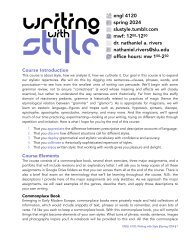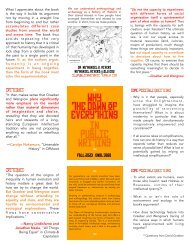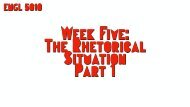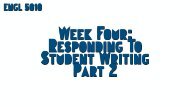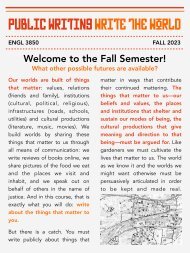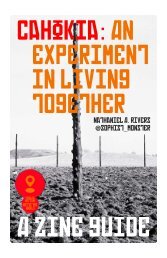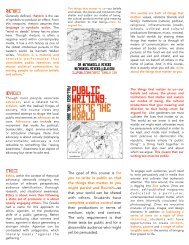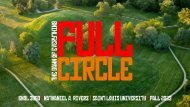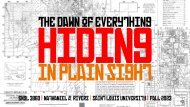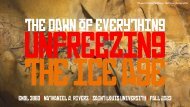ENGL 6040: Mol Keynote
You also want an ePaper? Increase the reach of your titles
YUMPU automatically turns print PDFs into web optimized ePapers that Google loves.
(post)<br />
The end is nigh. <br />
The end is now. <br />
The end was already.
eating in theory<br />
empirical philosophy<br />
“<br />
The theory relevant to this project is not a grand<br />
scheme that holds smaller elements together in<br />
the way a large wooden box may hold smaller<br />
wooden boxes. It is rather like a cloth that may<br />
be wrapped around or, alternatively, is folded<br />
within what is being said and done. It is a<br />
repository of metaphors to write in, models to<br />
think with, ways of speaking and forms of<br />
responding. It is a style (<strong>Mol</strong> 25).<br />
According to Bohr, theoretical concepts (e.g.,<br />
“position” and “momentum”) are not ideational in<br />
character but rather are specific physical<br />
{arrangements (Barad 47).<br />
(post)
eating in theory<br />
empirical philosophy<br />
“<br />
What if we were to stop celebrating ‘the human’s’<br />
cognitive reflections about the world, and take<br />
our cues instead from human metabolic<br />
engagements with the world? Or, to put it<br />
differently: What if our theoretical repertoires<br />
were to take inspiration not from thinking but<br />
from eating (<strong>Mol</strong> 3)?<br />
The move toward performative alternatives to<br />
representationalism shifts the focus from<br />
q u e s t i o n s o f c o r re s p o n d e n c e b e t we e n<br />
descriptions and reality (e.g., do they mirror nature<br />
or culture?) to matters of practices/doings/ {actions (Barad 802).<br />
(post)
eating in theory<br />
empirical philosophy<br />
“<br />
Shaped by this new feminist ethos, I revolted<br />
against the idea of casting aside as lowly the<br />
life-saving labor of people—women or otherwise<br />
—such as farmers, cooks, and cleaners (<strong>Mol</strong> 9-10).<br />
(post)
eating in theory<br />
empirical philosophy<br />
“<br />
But in thus celebrating rationality, philosophical<br />
anthropology downgraded physical labor and<br />
elevated humans above other creatures. This<br />
does not help when we seek to address concerns<br />
p e r t a i n i n g t o e c o l o g i c a l f r a g i l i t y. T h e<br />
Anthropocene requires us to revisit what we<br />
make of anthropos (<strong>Mol</strong> 20).<br />
(post)
“The Botany of Desire” (Michael Pollan + PBS)<br />
(post)
eing<br />
knowing<br />
doing<br />
relating<br />
(post)
eing ingredients<br />
<br />
Which beings are<br />
gathered in for this<br />
dish? Of what and who<br />
is it comprised? From<br />
when and where have<br />
those beings arrived?<br />
knowing tastes<br />
<br />
Which forms of<br />
knowing as sensation<br />
are cultivating in<br />
through the being of<br />
this dish? Of what and<br />
who is it comprised?<br />
From when and where<br />
have those beings<br />
arrived?<br />
doing techniques<br />
<br />
Which tools and<br />
techniques as other<br />
bodies are obligate to<br />
preparing this meal?<br />
And what does doing<br />
look and feel like?<br />
relating eater(n)<br />
<br />
Across which bodies is<br />
this meal consumed?<br />
Who and what and how<br />
is gathered through/as<br />
it? What specific<br />
relations are activated<br />
and brought into play?<br />
(post)
eing<br />
“<br />
Survival cannot be taken for granted […] This is a<br />
sad reality that in a philosophical tradition<br />
invested in thinking—however embodied—is all<br />
too easily forgotten. I am only to the extent that I<br />
exchange stuff with my surroundings (<strong>Mol</strong> 33).<br />
In eating, then, I am a semipermeable, internally<br />
differentiated being, getting enmeshed in<br />
intricate ways with pieces of my surroundings<br />
{(<strong>Mol</strong> 36).<br />
(post)
eing<br />
“[Bashkow] notes that many anthropologists shy<br />
away from affirming alterity because they<br />
presume that countering injustices depends on<br />
holding on to a universal human and inclusive<br />
humankind (<strong>Mol</strong> 33, 35).<br />
(post)
eing<br />
“<br />
Here is the lesson for theory. Eating suggests a<br />
model of being in which the body that is overflows<br />
into her surroundings. Some elements of that<br />
which was outside me I incorporate (<strong>Mol</strong> 43).<br />
Why do we think that the existence of relations<br />
{requires relata (Barad 812)?<br />
(post)
knowing<br />
“<br />
But is seeing necessarily a perceptive<br />
engagement by which a subject learns about<br />
the surrounding world? Maybe not always and<br />
maybe not everywhere (<strong>Mol</strong> 55).<br />
(post)
knowing<br />
“<br />
In the eating situations I describe, food is<br />
swallowed. This affects both the perceptive<br />
abilities and the sensations of the subjects who<br />
are eating. The model of knowing that emerges<br />
is neither objective nor subjective, but<br />
transformative (<strong>Mol</strong> 55).<br />
the agential cut enacts a local resolution within<br />
the phenomenon of the inherent ontological<br />
indeterminacy. In other words, relata do not<br />
preexist relations; rather, relata-withinphenomena<br />
emerge through specific intra- {actions (Barad 815).<br />
(post)
knowing<br />
“<br />
Perceiving is not the natural effect of the<br />
encounter between an eating subject and a food<br />
object, but a possible event occurring as a part<br />
of a complex socio-material practice. It is<br />
something that may happen, or not, something<br />
that may be done, or left undone (<strong>Mol</strong> 58).<br />
(post)
knowing<br />
“<br />
Here is the lesson for theory. Interacting with a<br />
food object may increase a person’s perceptive<br />
skills, but also her appreciative propensities. The<br />
taste of foods is bound to affect the taste of<br />
those who eat them. One’s liking may increase or<br />
decrease. This may be reversible or not. It may<br />
happen slowly, over repeated sessions, or<br />
remarkably fast, on a single occasion not so<br />
festive after all (<strong>Mol</strong> 67).<br />
(post)
doing<br />
“<br />
A task does not just happen; it is something that<br />
needs to be done. But this doing is not a matter<br />
of centrally controlled action, but of what might<br />
best be termed caring. Of negotiating, tinkering,<br />
trying, and trying again (<strong>Mol</strong> 77).<br />
“Humans” are neither pure cause nor pure effect<br />
but part of the world in its open-ended becoming<br />
{(Barad 821).<br />
(post)
doing<br />
“<br />
Here is the lesson for theory. Doing is not<br />
necessarily centered in an embodied individual.<br />
It may as well be distributed over a stretched-out,<br />
historically dispersed, socio-material collective<br />
(<strong>Mol</strong> 93).<br />
You get the picture. Described in this way, the I is<br />
not making choices for which she needs<br />
information. Nor is she being propelled by hidden<br />
{causes. Instead, she is cooking dinner (<strong>Mol</strong> 87).<br />
(post)
doing<br />
“<br />
Certainly, there is more to life than staying alive.<br />
But what I argue here is that ‘staying alive’<br />
already always entails that more. The eating on<br />
which survival depends is not ‘natural’ but<br />
‘cultivated.’ It is suspended between diverse<br />
socio-material configurations and may be done in<br />
different ways (<strong>Mol</strong> 100).<br />
(post)
doing<br />
“<br />
This lack of control, however, is no excuse for<br />
cynicism. Rather, it calls for another kind of ethics.<br />
An ethics without reassuring handholds, an ethics<br />
that does not envision this or that goal in<br />
isolation but realizes that deeds inevitably have<br />
diverse effects. An ethics that imagines worthy<br />
doing as caring, self-reflective, curious, attentive,<br />
adaptive. And tenacious (<strong>Mol</strong> 101).<br />
(post)
elating<br />
“<br />
This suggests a model of relating in which taking<br />
is not necessarily bad, while giving is not simply<br />
good. What makes a particular feeding/eating<br />
relation either good or bad cannot be sketched<br />
in broad strokes. It resides, again and again, in<br />
the specificities of the situation (<strong>Mol</strong> 114-15).<br />
The notion of intra-action (in contrast to the<br />
usual “interaction,” which presumes the prior<br />
existence of independent entities/relata)<br />
[describes how] the boundaries and properties of<br />
the “components” of phenomena become<br />
determinate and that particular embodied<br />
concepts become meaningful. <br />
{(Barad 815).<br />
(post)
elating<br />
“<br />
It is a virtuous cycle: a propensity to eat<br />
contributes to the cultivation of the variety; the<br />
easy availability of the variety increases the<br />
likelihood that more people will acquire a taste for<br />
it. Hence, while my eating this particular apple<br />
destroys what I bite off, chew, and swallow, our<br />
eating this kind of apple is generative. It helps to<br />
care for the trees that bear the fruits we covet<br />
(<strong>Mol</strong> 110).<br />
(post)
elating<br />
“<br />
Instead of seeking to know man, an alleged<br />
universal, anthropology should respect that<br />
different groups of people are profoundly<br />
different. They do not just look differently at the<br />
same reality; they live different realities. Their<br />
ontologies are different. Rather than embarking<br />
on an inquiry into what humankind has in<br />
common, Viveiros de Castro argues, we would do<br />
well to sincerely attend to equivocations, to nonequivalence<br />
(<strong>Mol</strong> 118).<br />
(post)
elating<br />
“<br />
Here is the lesson for theory. Eating relations<br />
turn not around degrees of similarity, but<br />
around agreement. If I am lucky, I love what I eat<br />
and I eat what I love. But eating is an<br />
asymmetrical relation. My love is of a violent kind.<br />
To compensate for that, to assuage it, I would do<br />
well to ask, again and again, what might agree<br />
with those of whom I eat. In theory, at least,<br />
eating offers a model of relating in which<br />
violence and love go together, intertwine (<strong>Mol</strong><br />
120).<br />
(post)
eating in theory<br />
empirical philosophy<br />
“<br />
If historical investigations show that things used<br />
to be otherwise, this offers the promise that they<br />
might become different again. And maybe they<br />
already are, somewhere else. As criticism is<br />
inevitably caught in the terms of those being<br />
criticized, it may be wiser to go out, run, play.<br />
Experiment with alternatives (<strong>Mol</strong> 18).<br />
(post)
eating in theory<br />
empirical philosophy<br />
“<br />
In the absence of an external, transcendental,<br />
position, normative questions cannot be<br />
answered in absolute terms. But they can still be<br />
asked. Not just by philosophers, in the abstract,<br />
but concretely, here, now, by everyone engaged<br />
in a particular practice (<strong>Mol</strong> 23).<br />
The differential constitution of the “human”<br />
(“nonhuman”) is always accompanied by<br />
particular exclusions and always open to<br />
{contestation (Barad 824).<br />
(post)
eating in theory<br />
intellectual ingredients<br />
“<br />
This particular kind of politics does not depend on<br />
conversations; rather, it is a matter of doing<br />
things in one way or another. It hinges not on<br />
decisions and choices, but on trying and<br />
adjusting. Ideally, it takes the shape of adaptive<br />
and responsive tinkering, of ongoing cultivation<br />
and never-ending care (<strong>Mol</strong> 137).<br />
Particular possibilities for acting exist at every<br />
moment, and these changing possibilities entail a<br />
responsibility to intervene in the world’s<br />
becoming, to contest and rework what matters<br />
{and what is excluded from mattering (Barad 827).<br />
(post)
eating in theory<br />
intellectual ingredients<br />
“<br />
What is more, disentangling desirable effects<br />
from unwanted side effects is not always easy.<br />
Doing is often ambivalent. Bad, but not just bad;<br />
good, but not just good. Not good for everyone.<br />
Not good enough. Suspended within complex<br />
normative force fields, doing goes on and on. It<br />
never comes to rest (<strong>Mol</strong> 142-43).<br />
(post)
(post)<br />
The end is nigh. <br />
The end is now. <br />
The end was already.




